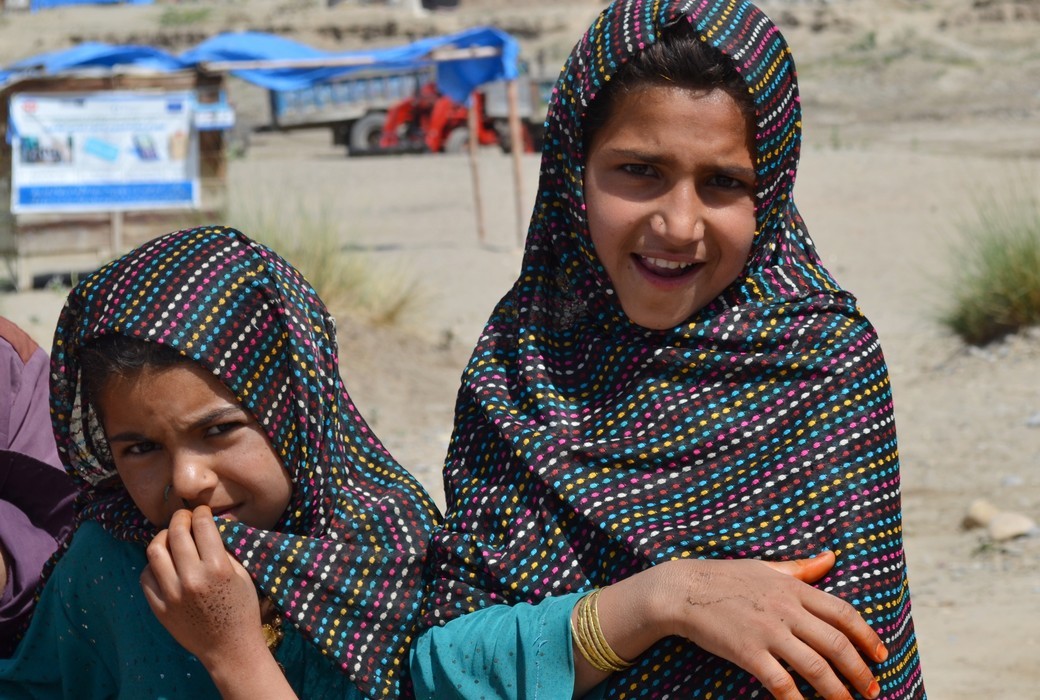Over the last decade Pakistan went through an intensive phase of complex emergency. There was military operation in north-west part of the country to root out extremism. The operation however resulted in displacement of over 5 million people. Most of the communities from North Waziristan moved to the nearby district of Bannu.
Bannu, being a small town was overloaded with people more than its capacity. This affected market function and daily lives of people of Bannu especially of the TDPs. TDPs could not find employment or any income generating activity which made their quality of life very low – well below humanitarian thresholds. They live in really small shelters – where family members often can’t even all lie down at the same time – and are at risk of infectious diseases. The limited access to clean water due to an insufficient sewage system and the lack of good hygiene practices are the main causes of the spread of diseases.
In Bannu, Cesvi is supporting 2.179 TDPs families, which amount to 17.432 people. They are provided with emergency shelter, latrines and access to clean water. Beneficiaries also take part in awareness raising initiatives on good hygiene practices. The projects are funded by ECHO (6.232 beneficiaries) and USAID (11.200 beneficiaries).
From the field: a text written by Yusra Qadir, Cesvi Programme Manager
Upon visiting the areas where the TDPs from FATA live, it is hard to miss colorful clothes clad children giggling away. Seems like the long displacement has made them adapt to the new surrounding and they have found activities to keep busy. They say that most of all they missed school – where they came from (North Waziristan) they used to go to school and they liked to learn; however, the displacement has rendered them out of the educational path. Children recount experiences of trauma and horror when they could hear attacks while military operation outrooted militancy – so though they missed their old routine, they were happy to be in a safe place.
Children spend their time playing with livestock or with mud and running around with friends. They got used to staying outdoors so as to escape the bad smell of their living spaces. Ali aged 12 says ‘The surroundings used to be so dirty that we could barely walk through the filth, but Cesvi’s people kept visiting. Women usually went in homes and spoke to women and men sat with men in the open and they encouraged people to clean their houses and the communal area. Now our homes are much cleaner… we sometimes even walk barefoot!’.
Children remember how bad the water used to taste before the handpump was installed; it was muddy and ‘have wobbly black things in it’, they specify. ‘Back in our hometown the water was so clean – almost sweet. But for so long we consumed water which didn’t even have the color of water’ says Ameer aged 14 ‘Since the handpump has been installed; I offer my family to bring water myself. I talk and play with my friends at the handpump, so going to fetch water is like fun for me.’ While she’s saying that, a little girl aged almost 3 and a half year comes over. She fights with the older girl: she is angry that Ameer is not letting her pump out the water. We learn that her name is Kashmala and she likes to pump water out for everyone who comes to fetch water. Older children say her she is too young to do that, but she doesn’t seem to understand it.
‘I never washed the back of my hands or the space between my fingers, but now I thoroughly wash my hands. The lady who teaches good hygiene taught me this’ says Aliya aged 6. Handwashing at critical times was one of the stressed components of the Cesvi supported project and it targeted TDPs including children. They not only have their overall hygiene improved but their medical expenses have also reduced. ‘I am so happy I don’t have to take frequent medication now. I don’t like the taste of medicine’ says Inaya aged 5, who used to get a lot of red blisters on her face and body.
We talk with Parveen Bibi, who shows us how she is now washing the clothes of her children regularly and how her children are now healthier and more active. ‘I even wash my hands before I cook now even if they are not dirty. I didn’t know that such a small thing can impact the health of my children so heavily.’ She proudly sits with her son Zeb and points out how clean his clothes are. We ask Zeb about whether he changes his clothes regularly or not and he answers to us by nodding yes.
The children remember their areas of origins, their lands, their large houses and the huge expanse of terrain that overlooked their abodes – they hope that they will be able to return back to their homes soon and that they will be able to resume their education and carry on their lives as they were.
For now, they are happy that their families received some assistance and that they are safe wherever they are.
